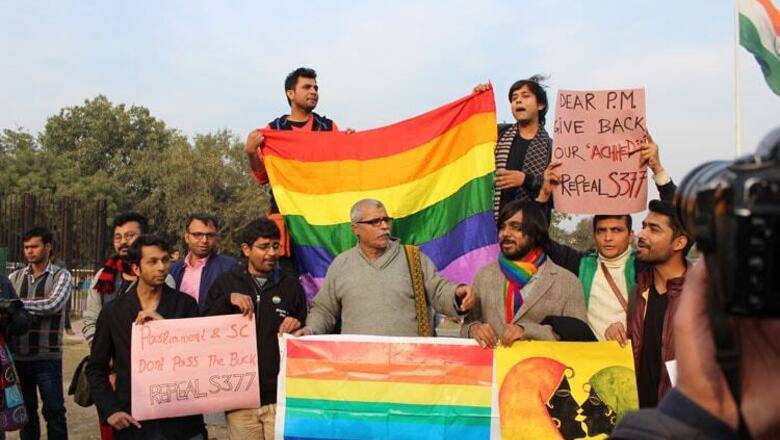
views
New Delhi: The Supreme Court has dismissed a review petition seeking various civil rights, such as same-sex marriage, adoption and surrogacy for the LGBTQ community. A bench headed by Chief Justice Ranjan Gogoi referred to the five-judge Constitution bench verdict of September 6 last year by which consensual gay sex was decriminalised and said that it was not
inclined to entertain the review plea seeking other reliefs.
"We are not inclined to entertain this petition after the decision of this Court in Navtej Singh Johar v Union of India decided on September 6, 2018," said the bench, also comprising Justices Deepak Gupta and Sanjiv Khanna.
The plea had sought civil rights of the LGBTQ (lesbian, gay, bisexual, transgender, transsexual, queer) community as part of the basic human rights and said that these rights were not addressed in the apex court's judgement on Section 377 of the IPC which had criminalised consensual gay sex.
It had sought recognition of their rights to same-sex marriages, adoption, surrogacy, IVF and directions so that the community can serve openly in the army, navy and air force.
"LGBTQ rights are not recognised as part of human rights. Non Recognition of same-sex marriages (Indian Special Marriages Act, 1954), availability of adoption, surrogacy, IVF (for LGBTQ only) is violative of Article 14, 15, 19, 21, 29. Discrimination solely on the basis of sexual orientation violates Article 14, 15, 21 in relation to Army, Navy, Air force Act.
"Other instances of indirect discrimination are not addressed in the Navtej Singh Johar case. People in the military are not allowed to serve openly. Heterosexual people end up marrying LGBT people, end up consummating the marriage with them, which harms heterosexual people most. Gay women have it worst," the plea had said.
The plea had said that the definition of marriage for LGBTQ had not been addressed in the apex court's judgement of September 6, 2018.
"Navtej Singh Johar case said nothing on the following issues -- whether equality of status is part of the right to equality, dignity related questions on marriage, its extent, privacy concerns regarding gay marriage," it had said.
The plea had further said not mentioning about sexual orientation and transgender as the third gender in a biological context (even in age-appropriate terms, sexually implicit and modest ways) in our textbooks has created a culture of treating them as abnormal which has been perpetuated via a government policy of omission.
"No uniform or objective definition of 'carnal intercourse against the order of nature' exists; it's just people defining what they want i.e whim. The definition can be subjectively interpreted to exclude or include, it can (the classification) be fanciful or imaginary, oppressive in nature depending upon who argues the case, it's subjective," it said.
The plea said both heterosexuals in an opposite-sex relationship and homosexuals in a same-sex relationship are similarly circumstanced as the general nature of relationship is romantic and
sexual one, either at the time of marriage as in a love marriage or is sought or hoped to be as in the case of arranged marriage.
"Both same-sex and opposite-sex relation is a consequence of people's private attractions or motivations. While they are similarly circumstanced, they are treated unequally i.e. marriage between heterosexuals in an opposite-sex relation is recognised while it is not recognised for homosexuals in a same-sex relationship," it said.
The plea added that it was "immoral" to deny the gays in a same-sex relation the freedom to marry each other as their relationship was private, consensual, harmless.
"Denying them causes psychological, societal and emotional harm to them, it's immoral. Compared with imaginary harm to societal norms that has no basis in a court of law. It was also against public health of a country that homosexuals are married to heterosexuals. It does violence to their dignity, gives other people excuse to ill-treat them, perpetuates social stigma," it said.



















Comments
0 comment